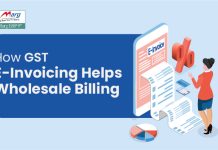Recent Updates on e-Invoicing:
11 October 2022
According to the new regulations, starting on January 1, 2023, enterprises with a turnover of more than 5 crores may use the next stage of e-invoicing. Additionally, towards the end of the following fiscal year, it can be extended to businesses with revenues of at least 1core.
1st August 2022
As of October 1, 2022, businesses having an annual aggregate turnover of more than Rs. 10 crore and up to Rs. 20 crore shall use the e-Invoicing system for B2B transactions, per notice by CBIC.
4th July 2022
According to a government official, in order to lower the barrier from the existing Rs 20 crore, the government intends to make GST e-invoicing mandatory for businesses with a turnover of Rs 10 crore and higher from 1-10-2022.
24th February 2022
According to Notification No. 1/2022, the e-Invoicing system will be made available to businesses with an annual turnover of more than Rs. 20 crore and up to Rs. 50 crore as of April 1, 2022.
30th June 2021
The CBIC has issued a notification proposing to waive the penalty imposed for non-compliance with dynamic QR code regulations for B2C invoices between December 1, 2020, and September 30, 2021.
1st June 2021
A government department and local authority are exempt from the e-invoicing system, according to CBIC’s Central Tax Notification No. 23, dated June 1, 2021.
30th March 2021
The CBIC has published a notification to waive the fine for failing to follow the rules for dynamic QR codes for B2C invoicing between 1 December 2020 and 30 June 2021, provided that the person in question complies with the notification’s requirements starting on 1 July 2021.
E-invoice mandatory for businesses with Rs. 10 Crore turnover from 1st October 2022
At present, e-Invoicing is mandatory for businesses with Rs. 20 Cr. turnover and above. In the latest announcement, the government has widened the ambit of e-Invoicing by lowering the mandatory threshold to Rs. 10 crores under the Goods & Services Tax regime. Businesses with an annual turnover of Rs 10 crore have to generate e-invoices starting from 1st October 2022.
This is aimed at digitizing more businesses. This move aims at creating more transparency in sales reporting, reducing errors and mismatches, improving compliance, and automating data entry work. According to the sources, the government soon plans to further extend it to businesses with a turnover of Rs. 5 crores.
The Central Board of Indirect Taxes and Customs (CBIC) notified amending the current threshold in line with the recommendations of the GST Council. e-Invoicing started in October 2020 and was first made mandatory for businesses with a turnover of Rs. 500 crores and above. This threshold was brought down to Rs. 100 crores & later to Rs. 20 crores in 2022 for business-to-business (B2B) transactions.
Officials claim that by next year, e-Invoicing will be mandatory for businesses with a turnover of Rs 5 crore & above. Experts claim that this move will help the tax authorities better analyse the trends and misuse of input tax credit across sectors to plug-in revenue leakage. According to the reports, in the last two years, tax officials have declared fake ITC NSE 0.75% worth over Rs. 50,000 crores.
Considering the timeline, the concerned businesses have to start preparing themselves and ramping up their IT systems to be able to stay compliant with the e-Invoicing norms. The taxpayer must generate invoices on Billing Software or their internal systems and then report to the invoice registration portal (IRP)- to get an input tax credit.
Free Download E-invoicing Software
FAQ
To whom e-Invoicing may apply?
e-Invoicing will be mandatory from 1st October 2022, for all businesses under the GST regime with an aggregate turnover exceeding Rs 10 crore in any of the previous financial years from 2017-18 to 2021-22.
To whom does e-Invoicing doesn’t apply?
e-Invoicing doesn’t apply to the following categories of people, irrespective of turnover:
- SEZ Unit
- An Insurer
- An NBFC
- GTA
- A Banking Company
- A Financial Institution
- A person supplying passenger transport services.
- A person who supplies the service of admission to the exhibition of cinematographic films in multiplex services.
What are the supplies covered under e-Invoicing?
- e-Invoicing applies to the following services:
- B2B Services
- Supplies to SEZs
- Exports (with or without payment of tax)
- Deemed Exports
Does e-Invoicing apply to nil-rated/ wholly exempted supplies?
No, e-invoicing is not applicable to nil-rated or wholly exempted supplies. In this case, only a bill is issued and not tax invoices.
Does e-Invoicing apply to nil-rated/ wholly exempted supplies?
No, e-Invoicing is not applicable to nil-rated or wholly exempted supplies. In this case, only a bill is issued and not tax invoices.
Does e-Invoicing apply to financial or commercial credit notes?
No, e-Invoicing is not applicable to financial or commercial credit notes.
What are the Benefits of e-Invoicing?
- Main benefit is the evasion of tax, as each invoice is authenticated from IRN portal.
- Auto-population of various data during GST return filing.
- Decrease in reconciliation problems & errors.
- Auto-generation of an e-way bill.






